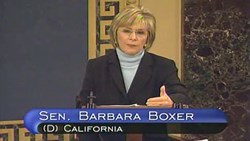No one leads the U.S. Office of International Religious Freedom (IRF) after two years of Barack Obama's presidency. The IRF vacancy demonstrates the low priority currently placed on religious freedom even though there is nearly unanimous, bipartisan support for international religious freedom in Congress.
Obama did not send a nomination to the Senate until June 2010, nominating Suzan Johnson Cook, a pastor long on religion but short on international human rights. The Senate then failed to act. The Senate Foreign Relations Committee did not hold a hearing on the nomination until November and the Senate never voted on the nomination. Senator DeMint (R-SC) put a hold on the nomination, effectively vetoing it, according to Samuel G. Freedman of the New York Times. As a result, the office remains vacant for the foreseeable future.
"The Obama administration seems to have decided that other policy initiatives – outreach to Muslim governments, obtaining China's cooperation, advancing gay rights – would be compromised by vigorous advocacy for religious freedom," Thomas Farr, the first director of the IRF, wrote in theWashington Post last year.
Farr said that the IRF office has been "emasculated" because the office is not treated like similar offices and no longer has the same staff reporting to it as in earlier administrations.

Open Doors USA, an advocacy group for the religious freedom of Christians, examined congressional officials who lead the fight for international religious freedom by evaluating who sponsored legislation. Leaders come from both the right and left, Republicans and Democrats. Open Doors gave Sen. Barbara Boxer (D-CA) the second highest score in the Senate. Sen. Benjamin Cardin (D-MD), Sen. Carl Levin (D-MI), and Sen. Ron Wyden (D-OR) also received high marks for their advocacy work.
The new 112th Congress may be less active on religious freedom issues because of important changes in the Senate. Sen. Sam Brownback (R-KS) was the key leader on the issue, but he left the Senate to become governor of Kansas. Sen. Kaufman (D-DE) and Sen. Bond (R-MO) are also not returning.
Other noted leaders on the scorecard are well-known among Christian conservatives. In the Senate, Sen. Brownback (R-KS), Sen. Tom Coburn (R-OK), Sen. James Inhofe (R-OK), and Sen. John Cornyn (R-TX) took the reins on several issues such as the plight of Coptic Christians in Egypt. Those in the House who actively supporting greater international religious freedom included Rep. Chris Smith (R-NJ), Rep. Frank Wolf (R-VA), Rep. Dan Burton (R-IN), Rep. Trent Franks (R-AZ), Rep. Mike Pence (R-IN), and Rep. Doug Lamborn (R-CO).
When legislators do advocate changes in U.S. foreign policy, their motives may be tied to constituency as much as conviction. Some Christian conservatives support the causes of Christians worldwide, such in Sudan, Egypt, or India. Calls on Turkey to allow the Ecumenical Patriarchate to operate a seminary come from legislators who represent areas with high Orthodox populations (e.g., New Jersey). Sen. Boxer has spearheaded legislation on religious liberty in Vietnam, and California has one of the largest Vietnamese immigrant populations in the United States.
Open Doors USA also examines resolutions that addressed the freedom for all religious groups from Baha'i in Iran to Yazidis in Iraq. When a religious freedom resolution comes up for a vote in Congress, it passes with little or no opposition.
The key, however, is to get a resolution to the floor for a vote. In the past two years, Congress has approved resolutions against religious liberty in Iran, Iraq, and China. But the House and Senate did not vote on resolutions against countries whose diplomatic relations are sensitive to issues of religious freedom, such as Turkey, Vietnam, and Pakistan.

Support Our Work
Subscribe to CT for less than $4.25/month


















